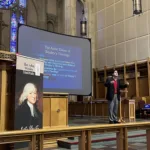The US court system’s use of precedent and stare decisis often leads to interesting results, where controversies are settled based on seemingly entirely unrelated controversies. Few could have predicted, for example, that the Supreme Court’s ruling in a dispute over Depression-era farm quotas would one day be used to uphold the individual mandate of the Affordable Care Act. It’s possible that a similar quirk may be in the works regarding the lawsuits filed against the Obama administration by Hobby Lobby and other religious businesses over the HHS birth control mandate. These religiously-operated for-profit businesses could triumph thanks to an unlikely savior: Citizens United.
It may seem odd that a case on campaign finance may affect a religious liberty case. In Citizens United v. FEC, the Supreme Court struck down the Bipartisan Campaign Reform Act’s provisions limiting the amount of money corporations and unions could spend on electioneering. The ruling was controversial because many worried that it would allow corporations undue influence in national elections. But it isn’t the results of Citizens United that might aid the birth control mandate challenges, so much as the reasoning behind the case: specifically, Citizens United’s reaffirmation of the First Amendment rights of corporations.
“Corporate personhood” has become quite the buzzword since the Supreme Court handed down its decision in early 2010. Despite the common misconception that Citizens United created the concept, corporate personhood is a legal doctrine dating back to the 1800’s. It simply states that corporations, being composed of individuals who are afforded constitutional rights, can also choose to exercise these rights in corporate form. The Supreme Court held in Citizens United that in particular, the First Amendment’s guarantee of free speech cannot be abridged based on how the speakers decide to organize themselves. Justice Scalia’s concurrence puts it best: “[The First Amendment’s] text offers no foothold for excluding any category of speaker, from single individuals to partnerships of individuals, to unincorporated associations of individuals, to incorporated associations of individuals.”
How does this relate to the birth control mandate? Hobby Lobby and other companies claim that their First Amendment right to exercise their religion is being violated, but it remains a matter of debate whether corporations even have that right. In the most recent court case, the U.S. Court of Appeals for the Third Circuit ruled 2-1 against a Mennonite furniture company suing over the contraception mandate, saying “we conclude that for-profit, secular corporations cannot engage in religious exercise.” Meanwhile, a majority of the Tenth Circuit ruled the opposite in Hobby Lobby’s lawsuit, claiming “we cannot see why an individual operating for-profit retains Free Exercise protections but an individual who incorporates… does not…”
As you can see, the Tenth Circuit’s language closely mirrors that of Citizens United, in that individuals do not forego their constitutional rights by incorporating. Indeed, the Tenth Circuit’s majority opinion specifically cites Citizens United on more than one occasion. In particular, they contested the government’s argument that for-profit companies were necessarily incapable of exercising religion: “Because Hobby Lobby and Mardel express themselves for religious purposes, the First Amendment logic of Citizens United…where the Supreme Court has recognized a First Amendment right of for-profit corporations to express themselves for political purposes, applies as well. We see no reason the Supreme Court would recognize constitutional protection for a corporation’s political expression but not its religious expression”.
The dissenting judge on the Third Circuit also cited Citizens United to challenge one of the majority’s crucial distinctions. The Third Circuit majority couldn’t claim that no corporations enjoy religious liberties (after all, churches themselves are ‘corporations’). So instead, they drew a distinction between nonprofit corporations and for-profit corporations. But as the dissent points out, this distinction was explicitly rejected in previous First Amendment cases. “In Citizens United v. Federal Election Commission…” the dissent notes, “the Supreme Court said, ‘[b]y suppressing the speech of manifold corporations, both for-profit and nonprofit, the Government prevents their voices and viewpoints from reaching the public…’”
Whether or not for-profit organizations can make religious liberty claims is only the threshold for whether or not the cases against the contraception mandate can go forward. After that threshold is met, courts will still be required to decide the validity of the Christian businesses’ claims. But it appears that Citizens United may at least give businesses like Hobby Lobby the opportunity to have their day in court.
No comments yet




